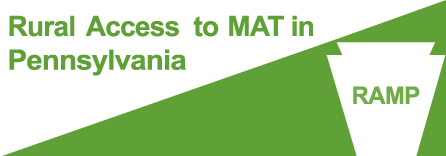This program trains rural primary care doctors to provide medication assisted treatment for opioid use disorder
Rapidly rising opioid overdoses and deaths make it a priority to increase the availability of effective treatment for opioid use disorder (OUD), especially in rural areas where addiction clinics are in short supply. The Rural Access to MAT program in Pennsylvania (Project RAMP) was initiated by the Pennsylvania Department of Human Services to train primary care physicians in rural counties to provide medication assisted treatment (MAT) for OUD. Primary care providers are given knowledge, skills, tools, and support so that they can deliver high-quality care for OUD with buprenorphine and other medications for opioid use disorder (MOUD).
Participants are given a curriculum on OUD, MAT, office protocols, and co-occurring disorders, and project staff and a Care Management Team are available to guide them in setting up a practice, described in a flow chart here. The program provides hands-on training in MAT and continuing peer support, and has recruited 26 primary care providers in 13 rural counties. Project RAMP thus serves as a model for how to increase treatment for OUD in rural areas.
Papers describing the purpose, design, and implementation of the program are available here and here. More information on the program is available here, and contact information is available at the program website. An expansion of the original project is described here.
Project RAMP provides primary care physicians in rural Pennsylvania with the knowledge, skills, tools, and support to provide the highest quality MAT services.









